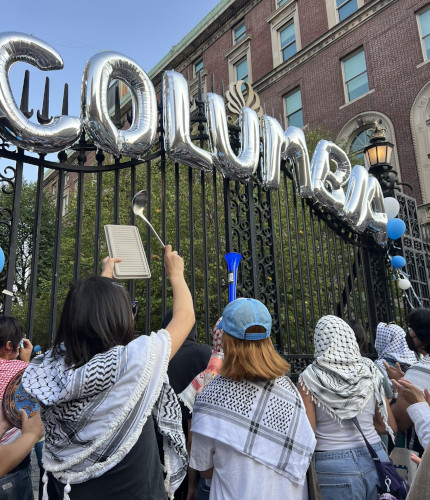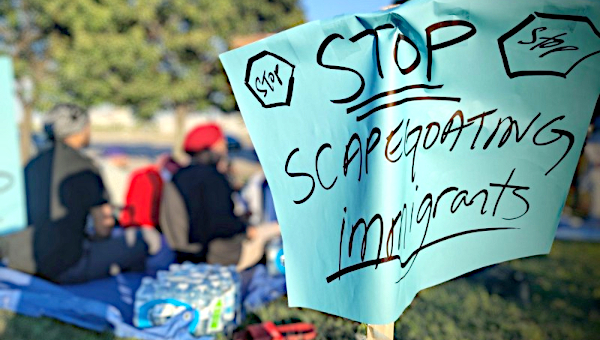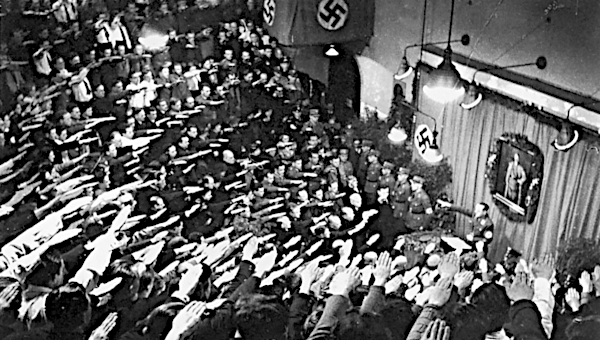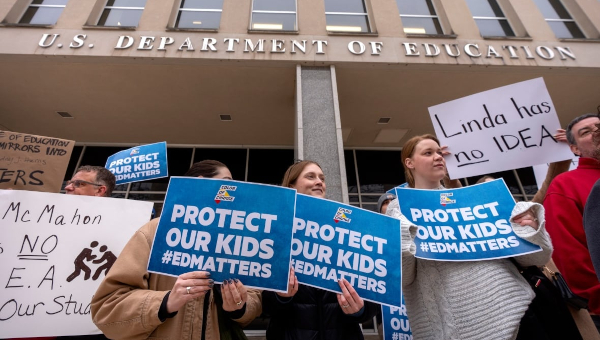As Classes Start, Universities Begin A New Wave Of Repression of Palestine Solidarity
University administrators are unleashing a fresh wave of attacks to discipline the Pro-Palestine movement. These draconian measures show the links between universities and the Zionist interests of the bipartisan regime.
Media outlets across the country have been reporting on the latest measures university administrators have been taking to prevent pro-Palestine demonstrations as the new school year begins.
The University of California and the California State University system – which is the largest public university system in the US – have both announced they will enforce a “zero tolerance” policy toward new encampments. Both Rutgers University and George Washington University have suspended Students for Justice in Palestine (SJP) at their campuses, with George Washington also suspending Jewish Voice for Peace (JVP). Meanwhile, Columbia University, which was the epicenter of the student movement, maintains a near-total lockdown that has closed the campus off to the public and is considering granting campus police the power to arrest students.

Against The Palestine Movement
These pre-emptive measures, among others across university campuses in the US, are meant to stoke fear among the defiant students, faculty members, and workers who have been standing up against the inhumane genocide in Palestine. The attacks are within a framework of a new McCarthyism across universities which deny even the basic right to protest.
This new McCarthyism is rooted in ideological positions like the idea that criticism of Zionism constitutes antisemitism. Due to the ideological importance of universities under capitalism in reproducing the ideas of the bourgeoisie, they have become ground zero for intimidation and attacks against students, faculty, and staff who dare to speak out.
After the encampment movement was brutally repressed in late May, leading to the arrests and suspension of thousands of students across the country (some of whom remain with charges and sanctions) the movement as a whole was put on the defensive, opening the door for the current wave of repression against the student movement.
What Is Behind This New Wave Of Attacks?
The administrative bureaucracies of the US academy have played a key role since the start of the movement for Palestine to discourage and repress students and staff speaking out against the genocide. In that sense, the university presidents and bureaucracy are strategically linked to maintaining the interests of the bipartisan regime as well as the material interests that many of these universities have with the state of Israel.
On the other hand, these administrators have not been able to repress as much as the Right Wing of the regime would like, especially the Trumpist Right, which is on the offensive against the “woke” university (which, despite its claims of progressiveness, also serves Zionism and capital). The congressional hearings helmed by Republican chairwoman Elise Stefanik has already led to a slew of resignations at elite college campuses, from the University of Pennsylvania to Harvard, Cornell, and now Columbia.
Last week, Minouche Shafik, the president of Columbia submitted her resignation just days after three Columbia College deans resigned after being placed on leave in late June for text messages, as part of an investigation into “antisemitism.” Though these administrators sat among the upper echelons of the university bureaucracy, their disciplining is rooted in right-wing attacks on academic freedom and education writ large that open space for more crackdowns against the entire movement. Therefore, Shafik’s resignation is a sign of giving into right-wing pressures and a political victory for that sector of the regime in particular.
In fact, Zionist university donors (who are simultaneously pulling funding from universities like Columbia) and their representatives in the halls of Congress are hoping to send a message to administrators across the country that they need to fall in line or meet the same fate. Despite her repressive actions against the movement, Shafik still had to step down and will move her career to the UK. She will not be held responsible for her attacks on basic democratic rights, for being the first university president to suspend SJP and JVP, for her half-hearted and slow response to a chemical attack on Pro-Palestinian students, for suspending students and professors,or for calling the NYPD to arrest and repress hundreds of students.
Now Columbia’s interim president, Katrina Armstrong, is tasked with assuaging donors and the imperialist regime that everything will be under control at the university. As Armstrong begins her tenure, Columbia faces an escalation in the investigation by the House Committee on Education and the Workforce for “on-campus antisemitism.”

At the same time, it seems that Armstrong is already making overtures to the student body in an attempt to bring students back in line with the interests of the university.“ We must take care to bridge divides, find common ground, define our rules and their consequences, and reach understanding based on our shared values,” Armstrong wrote in a statement to the university community.
Unsurprisingly many students aren’t fooled by the idea of a more “humane” university administration, especially in the context of an ongoing genocide, which these universities profit off of. “To my understanding, the University is simply just trying to, again, save face in the public eye, and kind of do anything in their power to suppress the organizing of the pro-Palestine movement,” said Cameron Jones, a Columbia student.
That’s because universities under capitalism are organized ideologically, politically, and materially to maintain the interests of the capitalist class. That’s exactly why it was possible for a number of influential billionaires to convince NYC Mayor and Democrat Eric Adams to work with Shafik to repress the student encampment at Columbia. Shafik and other bureaucrats are ultimately beholden to the bourgeoisie.
Advancing The Struggle Against Zionism Within Universities
Clearly, the struggle against Zionism within universities has shown the way that these institutions act like businesses and landlords under capitalism, always looking out for their bottom line and afraid to upset their donors. The encampments encouraged us to think of a new kind of university: one that is free, open to the public, run by faculty, staff, and students for the working class and oppressed.
Therefore, rather than try to pressure administrators of these kinds of universities in some misguided belief that they can be intermediaries between students and workers and the regime and business interests they are beholden to, we should turn our attention to the political tenacity and objective power that academic workers demonstrated during the student movement and in recent years, by going on strike and organizing rank and file assemblies to make decisions about how to best continue our struggles.
The experience of assemblies in particular as decision-making bodies show in an incipient way the potential for all decisions to be made democratically at universities, starting with how we organize our struggles and toward the fight for universities where students and workers democratically make all kinds of decisions in how those institutions are run. Indeed, universities don’t even need administrators or presidents at all. But in the meantime, they should be elected democratically by faculty, students, staff and the community through bodies of self-organization like deliberative assemblies.
The power of workers to shut down production can play a key role in advancing our struggles forward and as students we should give all our solidarity to the working class. The 1,200 UAW workers currently on strike at Cornell University following the historic UC workers strike that took place in May and June is one example of the way in which we can fight back the exploitative nature of the ivory tower. Most of the workers that are on strike at Cornell are food service workers, cooks, and custodians – some of the most exploited and precarious workers at universities.
As the genocide in Palestine reaches almost a year, the fight against attacks on our basic democratic rights to free speech and protest are key to giving a voice to the Pro-Palestine movement here and around the world. These kinds of attacks cannot be normalized so that we can continue to organize in our workplaces, schools, and on the streets for a free Palestine and for an end to a capitalist system that breeds exploitation and oppression. •
This article first published on the Left Voice website.





